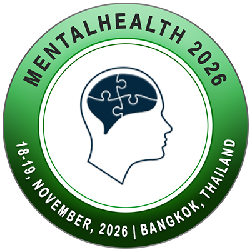Track: Autism
_(1).png)
“Understanding and Supporting Autism: Advancements, Challenges, and Opportunities”
This session will explore the complexities of Autism Spectrum Disorder (ASD), focusing on its characteristics, diagnosis, and management. Attendees will learn about the developmental and neurological aspects of autism, including common signs and symptoms, such as difficulties with social interaction, communication, and repetitive behaviors. The session will cover diagnostic criteria and assessment tools, as well as evidence-based interventions and therapies designed to support individuals with ASD. Emphasis will be placed on understanding the spectrum of autism, from mild to severe presentations, and how to tailor support and interventions to meet the needs of individuals across this spectrum.
Understanding Autism Spectrum Disorder (ASD)
An overview of Autism Spectrum Disorder (ASD), focusing on its definition, spectrum nature, and core characteristics. Participants will learn about the range of symptoms associated with ASD, including challenges in social communication, repetitive behaviors, and restricted interests. The session will highlight how autism manifests differently across individuals, from mild to severe cases, and the implications for diagnosis and treatment.
Diagnostic Criteria and Assessment Tools
An in-depth look at the diagnostic criteria for Autism Spectrum Disorder as outlined in the DSM-5. Participants will gain insights into the various assessment tools and methods used for diagnosing ASD, such as developmental histories, behavioral observations, and standardized assessments. The session will emphasize the importance of accurate diagnosis and early identification in managing autism effectively.
Early Intervention Techniques
A focus on early intervention strategies crucial for improving developmental outcomes in individuals with autism. Participants will explore evidence-based interventions such as Applied Behavior Analysis (ABA), the Early Start Denver Model (ESDM), and other developmental therapies. The session will highlight the benefits of early intervention in addressing core symptoms and promoting developmental progress.
Enhancing Communication Skills
A discussion of strategies for enhancing communication skills in individuals with autism. Attendees will learn about approaches like augmentative and alternative communication (AAC), speech therapy, and social communication training. The session will provide practical techniques for improving both verbal and non-verbal communication abilities.
Supporting Social Skills Development
An exploration of methods to foster social skills in individuals with autism. The session will cover interventions designed to improve social interactions, understanding of social cues, and relationship-building. Participants will learn about structured social skills training, role-playing exercises, and group activities aimed at enhancing social competencies.
Managing Sensory Sensitivities
An examination of sensory processing challenges faced by individuals with autism. Attendees will learn about common sensory sensitivities and strategies to manage sensory overload. The session will cover sensory integration therapy, environmental modifications, and the use of sensory tools to help individuals cope with sensory issues and improve their comfort and functioning.
Educational Strategies and Classroom Integration
An exploration of effective educational strategies and supports for students with autism. Participants will learn about creating individualized education plans (IEPs), implementing classroom accommodations, and utilizing teaching methods that cater to diverse learning needs. The session will focus on integrating students with autism into mainstream educational settings and supporting their academic success.
Transition Planning to Adulthood
A focus on preparing individuals with autism for the transition from adolescence to adulthood. Participants will explore strategies for vocational training, developing independent living skills, and accessing adult services. The session will emphasize the importance of planning for a successful transition to adult life and strategies for promoting long-term independence and self-sufficiency.
Scientific Highlights
- Mental Health
- Women’s Mental Health
- Psychology and Psychiatry
- Autism
- Stress, Anxiety and Depression
- Psychotherapy and Counseling Psychology
- Behavioral Health and Bullying
- Suicide and Self Harm
- Bipolar Disorder
- Schizophrenia
- Neurology and Neurological Disorder
- Addiction
- Obesity and Eating Disorder
- Child and Adolescent Psychiatry
- Obsessive Compulsive disorder
- Post-Traumatic Stress Disorder
- Personality Disorder
- Child Abuse
- Legal and Ethical Issues in Clinical Research


